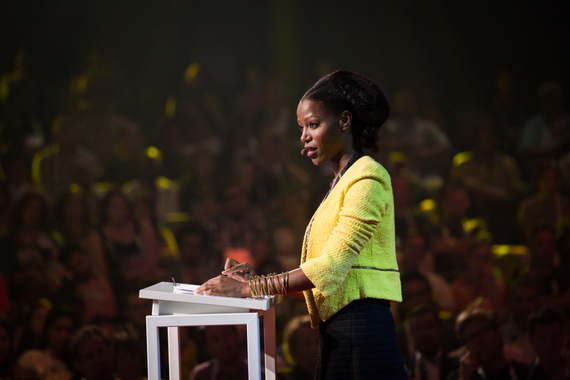Does the question "where are you from?" leave you struggling for an answer? Have you consciously come up with a pithy reply that suffices for small talk but leaves you feeling dissatisfied? Does the question feel reductive and the answer fail to capture the nuances of your experience? Whether you're an immigrant, a nomad, a third culture kid, or a cosmopolitan at home on the internet, having to answer where one is from can be a loaded experience for many.
Writer Taiye Selasi's exquisite speech from TEDGlobal 2014 is now online, and provides some fascinating perspectives that might come to your rescue.
"What are we really seeking, though, when we ask where someone comes from? And what are we really seeing when we hear an answer?" enquires Selasi, who is tired of being referred to as "multinational."
Countries, she says, represent power, and as recent immigrants know all too well, ""Where are you from?" or "Where are you really from?" is often code for "Why are you here?""
"Mexico. Poland. Bangladesh. Less power. America. Germany. Japan. More power. China. Russia. Ambiguous." says Selasi in her talk. "To me, a country -- this thing that could be born, die, expand, contract -- hardly seemed the basis for understanding a human being. History was real, cultures were real, but countries were invented. "
Not to mention, the vocabulary of coming from a particular place traps one into "the privileging of a fiction, the singular country, over reality: human experience" and "the myth of going back".
"We can never go back to a place and find it exactly where we left it," says Selasi. "Something, somewhere will always have changed, most of all, ourselves."
Instead, of asking "Where are you from?" we should be asking, "Where are you a local?" The difference, she says, is in the intention of the question, and shifts our focus to where the heart of human experience occurs.
Selasi proposes a 3-step test to determine where you're a local. She calls them the 3 R's: Rituals, Relationships, and Restrictions. "Take a piece of paper and put those three words on top of three columns, then try to fill those columns as honestly as you can," she says. "A very different picture of your life in local context, of your identity as a set of experiences, may emerge."
In terms of rituals, growing up in snowy, suburban Boston, Selasi incorporated practices her mother brought from London and Lagos. Rituals of the global south such as taking off shoes in the house, being polite to elders, and eating slow-cooked spicy food, she said, had her feeling very at home in Delhi and southern Italy.
"Who are the people who shape your weekly emotional experience?" Selasi asks of your relationships. Which of your relationships are "home" for you? (And yes, FaceTime counts!) For Selasi, this includes her mother in Accra, sister in Boston and best friends in New York.
Restrictions, she admits, are the least sexy of the 3 R's but help take you past "Where are you now?" to answer "Why aren't you there?" It focuses on factors such as the passport you hold, where you are able to live, racism that prevents you from feeling at home where you are, war, dysfunctional governance, economic inflation, etc. that keep you from living in the locality where you may have practiced your rituals as a child.
Such an perspective also reframes our understanding of diversity. A Mexican gardener in L.A. and a Nepali housekeeper in New Delhi have much in common in terms of rituals and restrictions. As do offspring of doctors and bankers in elite colleges hailing from different parts of the world. Are they not, as Selasi eloquently put it, "locals of the same milieu"?
"The more we know about where a story is set, the more local color and texture, the more human the characters start to feel, the more relatable, not less." says Selasi "All of us are multi -- multi-local, multi-layered. To begin our conversations with an acknowledgement of this complexity brings us closer together, I think, not further apart."
